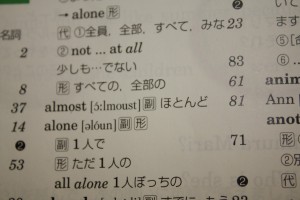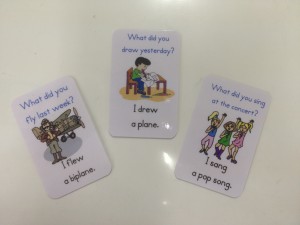Charles Browne and the New General Service List
Vocabulary is the key to language
Yeah, not this Charlie Brown. Or this one.
I saw this great TEDx talk by Charles Browne the other day. I know his work, have heard him speak several times at conferences, and have even had a chat a few times, but this talk pulled everything together for me. You may know his work at Word Engine, English Central, or ER-Central (all very close to my heart). He’s talking about the importance of vocabulary and his new New General Service List of common English words for learners.
Well worth twelve minutes of your time!
eikaiwa expectations high school JHS junior high school kids Language learning teaching vocabulary
by sendaiben
14 comments
My ‘almost’ mini-lesson
Unfortunately, many students in Japan are taught that ‘almost’ in English is ‘hotondo’ in Japanese
Sadly this is not true, so over the years I have developed a short mini-lesson to correct this false impression and help students better understand the meaning of almost.
The lesson can start at any time, but it requires a trigger: one of the students must translate almost as hotondo.
Once that happens, I quickly go through the following steps:
- I point out that even though many teachers and textbooks teach this, almost is not the same as hotondo
- I pretend to trip, and then say “phew, I almost fell over just now”
- I ask the students to translate the previous sentence: “hotondo korobimashita” sounds really strange, so clearly hotondo is not a good translation here
- I tell the students I planned to go to Tokyo this morning, but ended up not going. “I almost went to Tokyo”
- “Hotondo Tokyo ni ikimashita” also sounds weird
- I offer two alternative translations for almost: mou chotto de ~ and ~wo suru tokoro datta
- I explain that hotondo is actually almost all in English: mou chotto de zenbu
Of course, this illustrates vividly the perils of learning and teaching vocabulary out of context, which provides another excellent mini-lesson for the students 🙂
Do you have any favourite mini-lessons?
The JALT Vocabulary SIG Symposium
I was lucky enough to be able to attend this year’s JALT Vocabulary SIG Symposium on Saturday in Fukuoka. It was the first time for me to attend the event, and I found it useful enough to put it on my list to attend next year.
The format for the symposium was to have two sessions, one in the morning and one in the afternoon, with a poster session/lunch in between. Each session consisted of four twenty-minute presentations of research followed by comments from a discussant (this year Paul Nation and Yo In’nami served in this role).
Apart from the fact that it was held in Fukoka, which has the most convenient airport (5 minutes by subway from the central train station) and possibly the best ramen in Japan, the symposium had several other things going for it:
- the quality of presentations was high
- having a discussant comment on the research papers gave powerful insight into how to approach research
- having the entire symposium in one room allowed all the participants to have the same experience
- the venue was conveniently located ten minutes by subway from the city centre
- the organization was very smooth, with signs and volunteer guides, coffee sessions, and a well-organized poster session
Basically I was very impressed and recommend future Vocabulary SIG events -hope to see you at one in the future!
EFL eikaiwa ES kids language courses Language learning levity materials speaking teaching vocabulary
by sendaiben
6 comments
David Lisgo’s new card games
I am a big fan of David Lisgo‘s work, especially the Switchit card game.
Recently he has made a new set of card games based on verbs. Unlike Switchit, which is similar to UNO, these are more like a combination of Go Fish and Happy Families or Rummy.
Play is simple: players are dealt a number of cards and they try to collect sets of four by asking other players: if the other player has the cards, they hand them over; if not, the asking player takes a card from the middle (like Go Fish). Play continues until all the cards are gone or the time is up.
One caveat is that the game if played in full can take a long time: I have found setting a time limit or removing cards or sets from the deck helps speed things up.
Our students enjoyed the new game and I liked it very much as well. Students are talking a lot more, using full sentences, and getting a lot of practice with verb forms. These cards are a great addition to a teacher’s toolbox.
curriculum EFL evaluation expectations extensive listening extensive reading university vocabulary
by sendaiben
leave a comment
The shock of sudden realization…
I was having an imaginary conversation with my boss the other day (something that happens a bit too frequently, perhaps), and had just finished telling him what a ridiculous concept it was to judge the performance, impact, or value of a teacher by the amount of time they spent at work when I had a huge revelation.
That is precisely how I evaluate some of my students!
Particularly for extensive reading, vocabulary study (using online tools such as the Word Engine), and listening, I tend to look at how much time students spent doing an activity, rather than how effectively they did so. The student that spends twenty minutes intensely focused on the task will fare worse than the one who sits there daydreaming for an hour, even though they probably got much more out of it.
In my defense, the main reason for this is that it is fairly difficult to evaluate how effectively someone has, for instance, read something, but it is also down to laziness on my part. Just as it would be ridiculous for my boss to judge my performance solely by how long I spent sitting in my office, I need to start thinking about how to assess my students in a fairer and more accurate way.
Part of it, I suspect, is going to depend on me giving up on being a teacher (look out for a post on this next week!).
How about you? Do you evaluate students based on their presence rather than their engagement?



